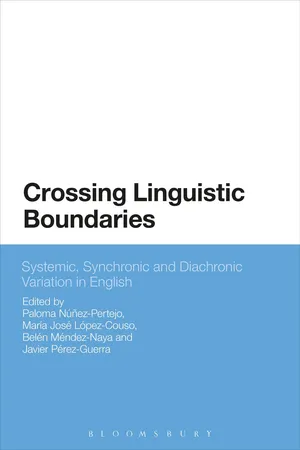
Crossing Linguistic Boundaries
Systemic, Synchronic and Diachronic Variation in English
- 288 pages
- English
- ePUB (mobile friendly)
- Available on iOS & Android
Crossing Linguistic Boundaries
Systemic, Synchronic and Diachronic Variation in English
About This Book
Breaking away from previously rigid descriptions of the linguistic system of the English language, Crossing Linguistic Boundaries explores fascinating case studies which refuse to fall neatly within the traditional definitions of linguistic domains and boundaries. Bringing together leading international scholars in English linguistics, this volume focusses on these controversies in relation to seeking to overcome the temporal and geographical limits of the English language. Approaching tensions in the areas of English phonology and phonetics, pragmatics, semantics, morphology and syntax, chapters discuss not only British and American English but also a wide variety of geographical variants. Containing synchronic and diachronic studies covering different periods in the history of English, Crossing Linguistic Boundaries will appeal to anyone interested in linguistic variation in English.
Frequently asked questions
Information
Part One
Tensioning the System
1
Prosodic Templates in English Idioms and Fixed Expressions
1. Introduction1
Table of contents
- Cover
- Half Title
- Series Page
- Title Page
- Contents
- List of Tables
- List of Figures
- List of Contributors
- Preface
- Introduction
- Part 1 Tensioning the System
- 1 Prosodic Templates in English Idioms and Fixed Expressions
- 2 Word-search as Word-formation? The Case of uh and um
- 3 Demonstratives Licensed by Cultural Co-presence
- 4 The Fall and Rise of English any
- 5 Revisiting ‘it-extraposition‘: The Historical Development of Constructions with Matrices (it)/(there) be + Noun Phrase followed by a Complement Clause
- 6 On Grammatical Change and Discourse Environments
- 7 Grammaticalizing Adverbs of English: The Case of still
- Part 2 Synchronic and Diachronic Variation
- 8 How British is Gibraltar English?
- 9 Singular they in Asian Englishes: A Case of Linguistic Democratization?
- 10 It is important that Mandatives (should) be studied across Different World Englishes and from a Construction Grammar Perspective
- 11 The Stative Progressive in Singapore English: A Panchronic Perspective
- Index
- Copyright